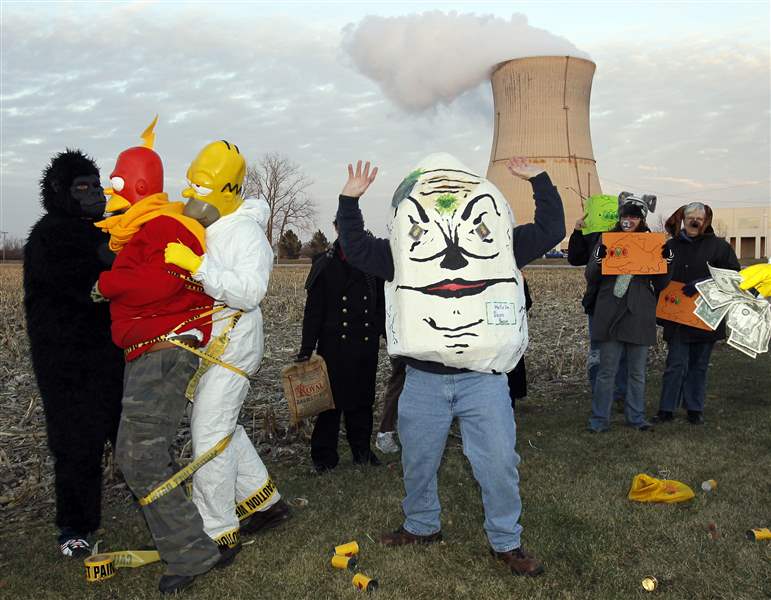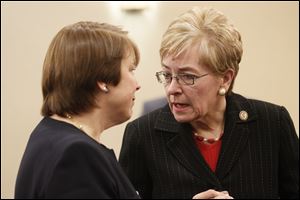
Davis-Besse's restart proper, company, NRC officials say
Issue debated during special meeting
1/6/2012
Michael Keegan of Monroe, a member of Don't Waste Michigan, portrays a cracked Humpty Dumpty as he and protesters perform.
THE BLADE/ANDY MORRISON
Buy This Image

Michael Keegan of Monroe, a member of Don't Waste Michigan, portrays a cracked Humpty Dumpty as he and protesters perform.
PORT CLINTON -- Allowing the Davis-Besse nuclear power plant to resume operations last month even though the causes of cracks in its concrete "shield building" remain unknown is proper because ongoing monitoring would flag worsening of the problem, FirstEnergy and Nuclear Regulatory Commission officials said during a special meeting about the issue Thursday night.
Cynthia Pederson, the NRC's acting regional administrator, assured several hundred people at the meeting at the Camp Perry Conference Center that her agency is fully prepared to order a plant shutdown or other corrective measures if conditions at Davis-Besse warrant.
NRC staff performed "a rigorous, independent review" of FirstEnergy's research and analysis, Ms. Pederson said.
"If we identify an issue" that renders any plant unsafe, she said, "we won't hesitate to take an action that causes that facility to shut down."
PHOTO GALLERY: NRC Davis-Besse Hearing
But Howard Whitcomb, a Port Clinton attorney who was an NRC resident inspector at a South Carolina nuclear plant during the mid-1980s followed by four years' employment with FirstEnergy at Davis-Besse, questioned how the federal regulators, without details of how, when, and why the cracks developed, "can tell the public they have reasonable assurance that the integrity of the shield building hasn't been compromised."
Mr. Whitcomb was among numerous speakers at the meeting who said the agency should have stopped the Carroll Township nuclear plant from being restarted until more is known about the shield building's condition.
Others -- particularly representatives of anti-nuclear groups that staged a brief protest outside the plant before the meeting -- said the cracking is further cause for federal regulators to shut the troubled plant down permanently, or at least not renew its operating license past its current 2017 expiration.
"Once again, we have production over safety," said Michael Keegan, a Michigan activist who compared the NRC's decision to allow a restart with its 2002 decision to allow plant operations to continue despite reactor-head liner corrosion that came within two-tenths of an inch of failure.
"The lesson I have learned is that the NRC is incapable of learning lessons," Mr. Keegan charged.
Ms. Pederson rebutted that nuclear safety, not operational concerns or plant profits, is the NRC's sole mission.
NRC officials took public comments after starting the meeting with 50 minutes of presentations from FirstEnergy Nuclear Operating Corp. and agency officials about how the cracking was discovered and studied.
The Davis-Besse plant was shut down for about two months, starting Oct. 1, for the replacement of its reactor head and other maintenance. The reactor-head replacement required cutting an access hole through the plant's steel reactor vessel and concrete shield building, which revealed a 30-foot, longitudinal, hairline crack near reinforcing steel behind decorative concrete fluting on the structure's outside.
Further study identified similar cracks elsewhere in the concrete, mainly near the "architectural elements" but also two small regions near the plant's main steam lines and in portions of the structure's top 20 feet.
Before the plant's restart early last month, FirstEnergy and the NRC agreed the utility would perform additional tests to confirm its findings of the cracking's extent and assess the possibility that it is spreading.

U.S. Rep. Marcy Kaptur speaks with NRC official Cynthia Pederson.
The federal agency directed FirstEnergy to file a "root-cause report" by Feb. 28, with further evaluation to be made during a refueling outage scheduled to start in early May.
"Conservative calculations demonstrate the Shield Building meets strength requirements. The Shield Building is structurally sound and is fully capable of performing its safety function. Davis-Besse is being operated safely," Barry Allen, FirstEnergy's site vice president for Davis-Besse, read from a prepared presentation.
Kenneth O'Brien, the NRC's deputy director for its division of reactor safety, said the Dec. 2 "confirmatory action letter" that green-lighted Davis-Besse's restart was based on a conclusion not that the cracking problem had been solved, but that with continued monitoring, the shield building was capable of functioning as intended.
"With the root-cause report, we will be better able to judge whether we agree or disagree" with the conclusions FirstEnergy has drawn from its research, said David Hills, the chief of NRC's Engineering Branch 1.
Rep. Marcy Kaptur (D., Toledo) opened the public-comment period by advocating for "evidence, not emotion," calling on the NRC to maintain rigorous safety oversight but noting also that the plant employs 800 union workers. Closing it, she said, would be devastating to Ottawa County's economy.
But Rep. Dennis Kucinich (D., Cleveland), who faces Miss Kaptur in a March primary battle following Congressional redistricting, argued the NRC had allowed FirstEnergy to conceal information about the cracking problem and misled the public into believing that cracks had been found only in the shield building's architectural flourishes, not its structural concrete.
Speaking by teleconference, David Lochbaum, of the Union of Concerned Scientists, said he too considered it unusual "to proclaim that a problem has been fixed before its cause has been determined."
Mr. O'Brien responded that the NRC has not, in fact, declared the cracking matter fixed: "We still believe there are issues the licensee [FirstEnergy] needs to look into."